A tribal leader blamed for inciting deadly xenophobic violence in South Africa has claimed he was misquoted and demanded an official investigation into the media.
King Goodwill Zwelithini, chief of the Zulu ethnic group, told about 10,000 people in Durban, the epicentre of the crisis, that if he had given an order to kill foreigners “this country would be reduced to ashes”.
The influential monarch was accused of sparking the attacks that have left at least seven people dead and displaced more than 5,000 when he said in a speech last month that “foreigners must pack their bags and go home”. His defenders claim the remarks, made in the Zulu language, have been misconstrued and only referred to the deportation of illegal immigrants.
Under growing political pressure, Zwelithini addressed an anti-xenophobia imbizo (gathering) at Durban’s Moses Mabhida stadium on Monday, and accused journalists of unfairly manipulating comments he made in Pongola on 15 March.
“Thousands of people who were present on that day have not killed anyone, nor have we heard of any violence taking place,” he said, according to a Zulu-English translation provided by eNews Channel Africa (eNCA). “Most of the things that are being said about me are not true. I understand that most of the people I am talking to understand the Zulu language well.”
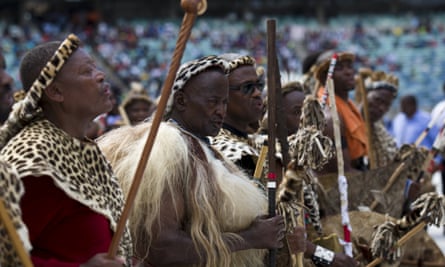
Zwelithini said he had written to the South African Human Rights Commission and called for it to examine the role of the media regarding violence against foreign nationals. He said: “We believe that the media in South Africa will also be willing to be investigated if there is nothing they have that they’re hiding.
“The speech that I made at Pongola was directed to peace but I cannot see it in any newspaper or on the radio. But what I see is that people are being fed just an excerpt, a small part of what I said, and also out of context, which is actually ludicrous and laughable. Even now I still challenge the media: let them come forward with the entire speech that I made. This speech has become central and very important. It has become even more important now than when it was given.
“Like I said last week, if the reports that I sparked the recent xenophobic attacks were true, this country would be reduced to ashes.”
Wearing a suit instead of his traditional leopardskin attire, the king made reference to the 1994 Rwandan genocide and the recent terrorist attack on students in Garissa, Kenya, before calling on Zulus to protect immigrants. He said: “We need to make sure no more foreigners are attacked. We must stop these vile acts.
“I called you all here today so we can start a real war which is needed now. The war I am referring to is to ensure that all foreign nationals in South Africa, regardless of which country they come from, are protected.
“It is unfortunate that we have to face this difficulty because of misreporting of what I said. There are many vile things that are being written in newspapers about me and you, the Zulu people ... I am saying to you, Zulu people, peace must be first and foremost.”
The event featured traditional Zulu dancers but some hostile sections of the crowd sang songs calling for immigrants to leave. Zwelithini was introduced by Prince Mangosuthu Buthelezi, the veteran leader of the Inkatha Freedom party, who said: “Regardless of how one interprets what his majesty said, one thing is clear. He never decreed violence, mayhem, looting, murder or arson.”
Government ministers have been accused of failing to keep the king in check even though he is unelected and does not hold political office. His speech was immediately criticised by Nomboniso Gasa, an academic and analyst of leadership and cultural issues. She told eNCA: “Actually what is significant is what he did not say, and I think this is where we can read where the king’s mind is and where his feelings are.
“We saw a man who holds a very important position in South African society who does not feel his original remarks, and the second remarks he made, need any explanation. We saw a man who feels he needs to defend himself and contradict what he said or deny what he said originally. The king went on the offensive to attack the media. At no point did he reflect on his own statement and how possibly that statement could have been misinterpreted.”
Gasa added: “The entire speech of King Goodwill Zwelithini was aimed at explaining himself: incredibly defensive and also provocative. When he said, ‘if it were true that I sparked the xenophobic violence, this country would have been reduced to ashes’, there’s a threat there. He says, ‘I can command with my mouth, I can command a scorched earth policy or practice, and I chose not to’.”
The wave of anti-immigrant violence started in Durban and spread to the commercial capital, Johannesburg, last week. The government said police have arrested 307 suspects and accused some people of using social media to spread fear. It said: “They have been sending out fictitious SMS and WhatsApp messages with fictitious and photoshopped images warning people of imminent attacks.”
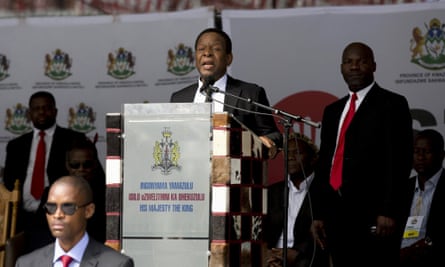
South Africa’s Sunday Times newspaper printed photographs of an attack in Johannesburg’s Alexandra township on a Mozambican man, identified as Emmanuel Sithole, who died after being beaten and stabbed early on Saturday. A nearby clinic could not help him because the doctor was a foreigner who did not go to work, fearing for his own safety, the newspaper reported.
Some African countries are arranging to repatriate their citizens, and there have been protests and calls in Malawi, Zimbabwe and other nations for a boycott of South African goods.
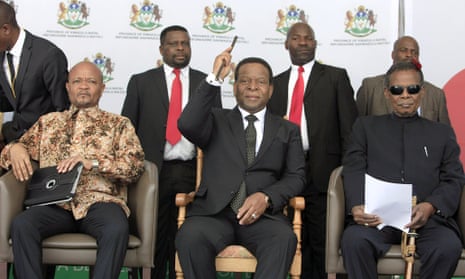

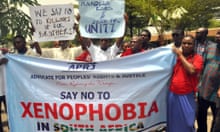
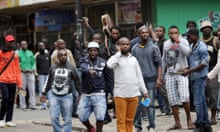
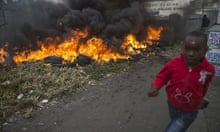
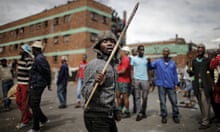
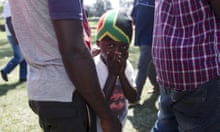

Comments (…)
Sign in or create your Guardian account to join the discussion